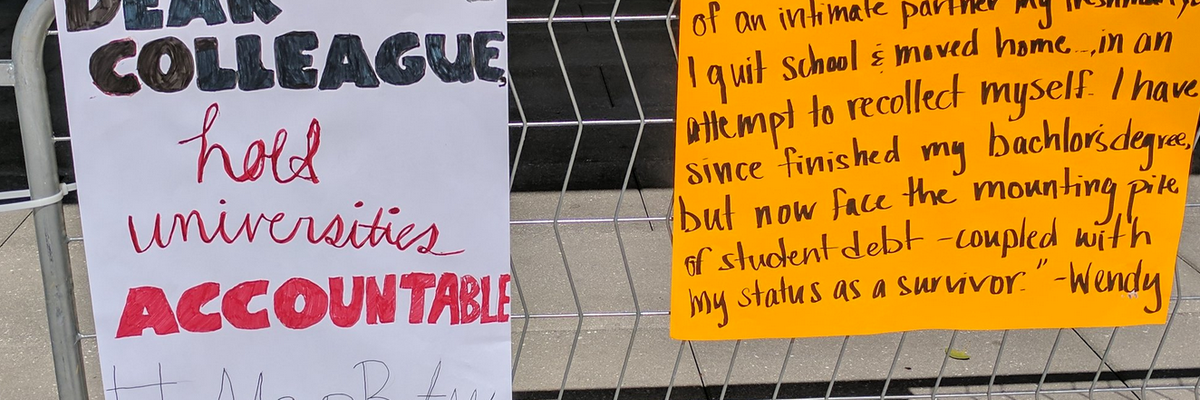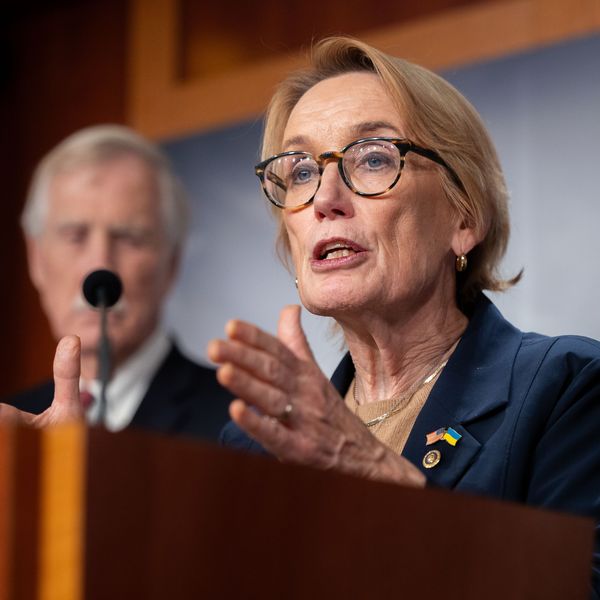
Protesters left signs outside the Department of Education on Thursday as Secretary Betsy DeVos announced she would open a comment period before rolling back Title IX guidance. (Photo: @gregpiper/Twitter)
Pushing 'False Equivalence' Between Survivors and the Accused, DeVos to Roll Back Title IX
After meeting with fringe "mens' rights" group, Education Secretary will re-examine guidance that protects campus assault survivors
Advocates for sexual assault survivors criticized the Trump administration's announcement on Thursday that it would roll back Obama-era guidance on campus assault.
As dozens of protesters gathered outside to demand continued protections for survivors, Education Secretary Betsy DeVos said in a speech at George Mason University that the administration will begin a public comment period as it restructures its sexual assault policy--but she made clear that she would not uphold the previous administration's guidance.
"Don't be duped by today's announcement. What seems procedural is a blunt attack on survivors of sexual assault."--Fatima Goss Graves, National Women's Law Center
"The era of rule-by-letter is over," DeVos said, referring to the Dear Colleague Letter that served as the basis for President Obama's 2011 directive on Title IX, the federal law that prohibits sex-based discrimination at schools. The guidelines, outlined in the letter, require universities to swiftly investigate complaints of sexual assault and offer protections to survivors, and ban schools from retaliating against those who file sexual assault complaints.
DeVos said the guidance has "weaponized the Office for Civil Rights to work against schools and against students," and criticized the procedures used by schools to investigate sexual assault cases, which allowed a lower standard of proof to be used in disciplinary hearings than would generally be used in criminal cases.
"Washington's push to require schools to establish these quasi-legal structures to address sexual misconduct comes up short for far too many students," DeVos said.
Critics of the Obama-era guidance, including DeVos, have said it pays insufficient attention to the rights of the accused. While observing the right to due process is imperative in any criminal justice system, sexual assault survivors' advocates have denounced DeVos's approach to reforming Title IX, particularly during the sole listening session she held in July on the matter, in which she included a fringe "men's rights group" as well as survivors.
In an interview with the Washington Post, Jess Davidson, the managing director of End Rape on Campus said the meeting felt "a little bit like paying lip service to the importance of having survivors in the room."
"It's really telling us that we don't matter, that our pain is not relevant to people in power," Chessy Prout, a survivor of assault, told the Post.
DeVos's critics also rejected the notion of that students are frequently accused of assault on false grounds. In a 2012 study, the National Sexual Violence Resource Center found that false accusations made up between two and ten percent of reported assaults, while 63 percent of assaults were never reported to the police--suggesting that crimes are actually under-reported.
"I think there's been a really concerning false equivalence of the concerns of survivors and the accused throughout this entire process with the Department of Education," Davidson said.
Fatima Goss Graves of the National Women's Law Center was skeptical about the impending comment period touted by DeVos in her speech.
"Don't be duped by today's announcement," said Graves in a statement. "What seems procedural is a blunt attack on survivors of sexual assault. It will discourage schools from taking steps to comply with the law--just at the moment when they are finally working to get it right. And it sends a frightening message to all students: Your government does not have your back if your rights are violated. This misguided approach signals a green light to sweep sexual assault further under the rug."
An Urgent Message From Our Co-Founder
Dear Common Dreams reader, The U.S. is on a fast track to authoritarianism like nothing I've ever seen. Meanwhile, corporate news outlets are utterly capitulating to Trump, twisting their coverage to avoid drawing his ire while lining up to stuff cash in his pockets. That's why I believe that Common Dreams is doing the best and most consequential reporting that we've ever done. Our small but mighty team is a progressive reporting powerhouse, covering the news every day that the corporate media never will. Our mission has always been simple: To inform. To inspire. And to ignite change for the common good. Now here's the key piece that I want all our readers to understand: None of this would be possible without your financial support. That's not just some fundraising cliche. It's the absolute and literal truth. We don't accept corporate advertising and never will. We don't have a paywall because we don't think people should be blocked from critical news based on their ability to pay. Everything we do is funded by the donations of readers like you. Will you donate now to help power the nonprofit, independent reporting of Common Dreams? Thank you for being a vital member of our community. Together, we can keep independent journalism alive when it’s needed most. - Craig Brown, Co-founder |
Advocates for sexual assault survivors criticized the Trump administration's announcement on Thursday that it would roll back Obama-era guidance on campus assault.
As dozens of protesters gathered outside to demand continued protections for survivors, Education Secretary Betsy DeVos said in a speech at George Mason University that the administration will begin a public comment period as it restructures its sexual assault policy--but she made clear that she would not uphold the previous administration's guidance.
"Don't be duped by today's announcement. What seems procedural is a blunt attack on survivors of sexual assault."--Fatima Goss Graves, National Women's Law Center
"The era of rule-by-letter is over," DeVos said, referring to the Dear Colleague Letter that served as the basis for President Obama's 2011 directive on Title IX, the federal law that prohibits sex-based discrimination at schools. The guidelines, outlined in the letter, require universities to swiftly investigate complaints of sexual assault and offer protections to survivors, and ban schools from retaliating against those who file sexual assault complaints.
DeVos said the guidance has "weaponized the Office for Civil Rights to work against schools and against students," and criticized the procedures used by schools to investigate sexual assault cases, which allowed a lower standard of proof to be used in disciplinary hearings than would generally be used in criminal cases.
"Washington's push to require schools to establish these quasi-legal structures to address sexual misconduct comes up short for far too many students," DeVos said.
Critics of the Obama-era guidance, including DeVos, have said it pays insufficient attention to the rights of the accused. While observing the right to due process is imperative in any criminal justice system, sexual assault survivors' advocates have denounced DeVos's approach to reforming Title IX, particularly during the sole listening session she held in July on the matter, in which she included a fringe "men's rights group" as well as survivors.
In an interview with the Washington Post, Jess Davidson, the managing director of End Rape on Campus said the meeting felt "a little bit like paying lip service to the importance of having survivors in the room."
"It's really telling us that we don't matter, that our pain is not relevant to people in power," Chessy Prout, a survivor of assault, told the Post.
DeVos's critics also rejected the notion of that students are frequently accused of assault on false grounds. In a 2012 study, the National Sexual Violence Resource Center found that false accusations made up between two and ten percent of reported assaults, while 63 percent of assaults were never reported to the police--suggesting that crimes are actually under-reported.
"I think there's been a really concerning false equivalence of the concerns of survivors and the accused throughout this entire process with the Department of Education," Davidson said.
Fatima Goss Graves of the National Women's Law Center was skeptical about the impending comment period touted by DeVos in her speech.
"Don't be duped by today's announcement," said Graves in a statement. "What seems procedural is a blunt attack on survivors of sexual assault. It will discourage schools from taking steps to comply with the law--just at the moment when they are finally working to get it right. And it sends a frightening message to all students: Your government does not have your back if your rights are violated. This misguided approach signals a green light to sweep sexual assault further under the rug."
Advocates for sexual assault survivors criticized the Trump administration's announcement on Thursday that it would roll back Obama-era guidance on campus assault.
As dozens of protesters gathered outside to demand continued protections for survivors, Education Secretary Betsy DeVos said in a speech at George Mason University that the administration will begin a public comment period as it restructures its sexual assault policy--but she made clear that she would not uphold the previous administration's guidance.
"Don't be duped by today's announcement. What seems procedural is a blunt attack on survivors of sexual assault."--Fatima Goss Graves, National Women's Law Center
"The era of rule-by-letter is over," DeVos said, referring to the Dear Colleague Letter that served as the basis for President Obama's 2011 directive on Title IX, the federal law that prohibits sex-based discrimination at schools. The guidelines, outlined in the letter, require universities to swiftly investigate complaints of sexual assault and offer protections to survivors, and ban schools from retaliating against those who file sexual assault complaints.
DeVos said the guidance has "weaponized the Office for Civil Rights to work against schools and against students," and criticized the procedures used by schools to investigate sexual assault cases, which allowed a lower standard of proof to be used in disciplinary hearings than would generally be used in criminal cases.
"Washington's push to require schools to establish these quasi-legal structures to address sexual misconduct comes up short for far too many students," DeVos said.
Critics of the Obama-era guidance, including DeVos, have said it pays insufficient attention to the rights of the accused. While observing the right to due process is imperative in any criminal justice system, sexual assault survivors' advocates have denounced DeVos's approach to reforming Title IX, particularly during the sole listening session she held in July on the matter, in which she included a fringe "men's rights group" as well as survivors.
In an interview with the Washington Post, Jess Davidson, the managing director of End Rape on Campus said the meeting felt "a little bit like paying lip service to the importance of having survivors in the room."
"It's really telling us that we don't matter, that our pain is not relevant to people in power," Chessy Prout, a survivor of assault, told the Post.
DeVos's critics also rejected the notion of that students are frequently accused of assault on false grounds. In a 2012 study, the National Sexual Violence Resource Center found that false accusations made up between two and ten percent of reported assaults, while 63 percent of assaults were never reported to the police--suggesting that crimes are actually under-reported.
"I think there's been a really concerning false equivalence of the concerns of survivors and the accused throughout this entire process with the Department of Education," Davidson said.
Fatima Goss Graves of the National Women's Law Center was skeptical about the impending comment period touted by DeVos in her speech.
"Don't be duped by today's announcement," said Graves in a statement. "What seems procedural is a blunt attack on survivors of sexual assault. It will discourage schools from taking steps to comply with the law--just at the moment when they are finally working to get it right. And it sends a frightening message to all students: Your government does not have your back if your rights are violated. This misguided approach signals a green light to sweep sexual assault further under the rug."

